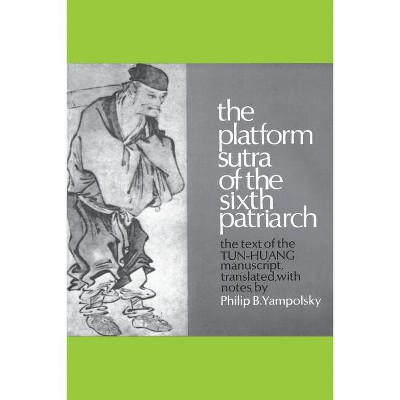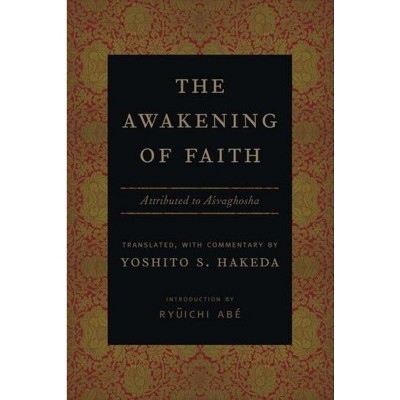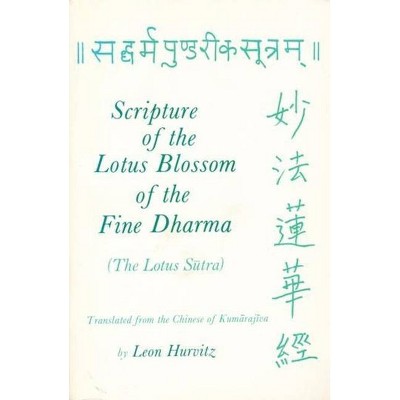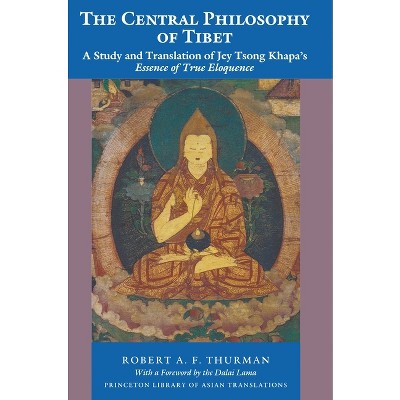Sponsored

The Platform Sutra of the Sixth Patriarch - (Translations from the Asian Classics) (Paperback)
In Stock
Sponsored
About this item
Highlights
- Dating back to the eighth century C.E., the Platform Sutra of the Sixth Patriarch is a foundational text of Chan/Zen Buddhism that reveals much about the early evolution of Chinese Chan and the ideological origins of Japanese Zen and Korean Son.
- About the Author: Philip B. Yampolsky (1920-1996) was professor of East Asian languages and cultures and director of the C. V. Starr East Asian Library at Columbia University.
- 276 Pages
- Religion + Beliefs, Buddhism
- Series Name: Translations from the Asian Classics
Description
Book Synopsis
Dating back to the eighth century C.E., the Platform Sutra of the Sixth Patriarch is a foundational text of Chan/Zen Buddhism that reveals much about the early evolution of Chinese Chan and the ideological origins of Japanese Zen and Korean Son. Purported to be the recorded words of the famed Huineng, who was understood to be the Sixth Patriarch of Chan and the father of all later Chan/Zen Buddhism, the Platform Sutra illuminates fundamental Chan Buddhist principles in an expressive sermon that describes how Huineng overcame great personal and ideological challenges to uphold the exalted lineage of the enlightened Chan patriarchs while realizing the ultimate Buddhist truth of the original, pure nature of all sentient beings.
Huineng seems to reject meditation, the value of good karma, and the worship of the buddhas, conferring instead a set of "formless precepts" on his audience, marked by embedded notes in the text. In his central message, an inherent, perfect buddha nature stands as the original true condition of all sentient beings, which people of all backgrounds can experience for themselves. Philip Yampolsky's masterful translation contains extensive explanatory notes and an edited, amended version of the Chinese text. His introduction critically considers the background and historical setting of the work and locates Huineng's place within the history and legends of Chan Buddhism. This new edition features a foreword by Morten Schlütter further situating the Platform Sutra within recent historical research and textual evidence, and an updated glossary that includes the modern pinyin system of transcription.Review Quotes
Praise for the previous edition:
"[Yampolsky] has consulted a considerable amount of Chinese and Japanese material and has given us the most comprehensive and most scholarly account of the subject in English."--Journal of the American Oriental Society
"[This] translation of one of the most famous of all Chinese Ch'an texts is certainly the best rendition so far. Without sacrificing scholarly accuracy, Yampolsky has produced a lucid and idiomatic translation which even the layman can enjoy."--Books Abroad
"Remarkable.... Yampolsky's study is characterized by a clarity of presentation and a thoroughness of exploration of Chinese and Japanese sources."--Philosophy East and West
"A good glossary and a valuable bibliography. The addition of the Chinese text of the Sutra (Tun-Huang version) will be particularly welcome to those who read Chinese."--Journal of Asian Studies
Praise for the previous edition:
"[Yampolsky] has consulted a considerable amount of Chinese and Japanese material and has given us the most comprehensive and most scholarly account of the subject in English."--"Journal of the American Oriental Society
""[This] translation of one of the most famous of all Chinese Ch'an texts is certainly the best rendition so far. Without sacrificing scholarly accuracy, Yampolsky has produced a lucid and idiomatic translation which even the layman can enjoy."--"Books Abroad
""Remarkable.... Yampolsky's study is characterized by a clarity of presentation and a thoroughness of exploration of Chinese and Japanese sources."--"Philosophy East and West
""A good glossary and a valuable bibliography. The addition of the Chinese text of the Sutra (Tun-Huang version) will be particularly welcome to those who read Chinese."--"Journal of Asian Studies"
Praise for the previous edition: "Yampolsky has considered the text with great care, has compared with later texts and studies, and has taken great advantage of previous emendations.... He has consulted a considerable amount of Chinese and Japanese material and has given us the most comprehensive and most scholarly account of the subject in English."-- "Journal of the American Oriental Society""(This) translation of one of the most famous of all Chinese Ch'an texts is certainly the best rendition so far. Without sacrificing scholarly accuracy, Yampolsky has produced a lucid and idiomatic translation which even the layman can enjoy."-- "Books Abroad""Remarkable.... Yampolsky's study is characterized by a clarity of presentation and a thoroughness of exploration of Chinese and Japanese sources."&mdash "Philosophy East and West""A good glossary and a valuable bibliography. The addition of the Chinese text of the Sutra (Tun-Huang version) will be particularly welcome to those who read C
About the Author
Philip B. Yampolsky (1920-1996) was professor of East Asian languages and cultures and director of the C. V. Starr East Asian Library at Columbia University. An eminent translator and scholar of Zen Buddhist texts, he edited Letters of Nichiren and Selected Writings of Nichiren and translated The Zen Master Hakuin: Selected Writings.
Morten Schlütter is an associate professor at the University of Iowa. He is the author of How Zen Became Zen: The Dispute Over Enlightenment and the Formation of Chan Buddhism in Song-Dynasty China and coeditor, with Stephen F. Teiser, of Readings of the Platform Sutra.Shipping details
Return details
Frequently bought together





Trending Non-Fiction












